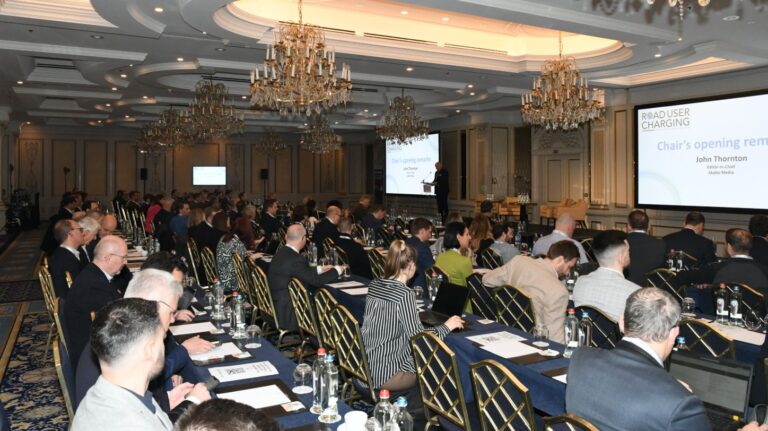The 22nd edition of the Road User Charging Conference returned to Brussels on 4-5 March 2025, welcoming more than 150 experts, policymakers and technologists from across the world.
With 26 presentations spanning Europe, North America, Asia and the Middle East, this year’s event reaffirmed the evolving role of user-financed transportation models in shaping equitable, sustainable and efficient transport systems.
Moderated by Akabo Media editor-in-chief John Thornton, the two-day event showcased how tolling, pricing and road usage charging (RUC) are no longer merely revenue tools. Instead, they’re becoming central to achieving wider social and environmental goals – from traffic decongestion and air quality to infrastructure renewal and climate resilience.
London, New York and Tallinn share experience
Delegates heard from the teams behind some of the world’s leading RUC schemes. Transport for London’s Capita-led presentation detailed how its modular and scalable system supports the UK capital’s clean air targets. Meanwhile, New York City’s first-in-the-nation congestion pricing scheme – operational since January – is already reducing traffic volumes and increasing trip speeds, according to MTA Bridges and Tunnels’ COO Dr Allison C. de Cerreño.
Kristjan Järvan, deputy mayor of transport for Tallinn, highlighted how free public transport has been successfully delivered in Estonia’s capital for more than a decade, making the case that investment and innovation can coexist under socially progressive policies.
RUC as a lever for change across Europe
Representatives from Türkiye, Portugal and Iceland shared updates on transitions to digital and distance-based tolling. Iceland’s electric vehicle road charge achieved a 97% registration rate in its first year, while Portugal continues to balance toll removal with investments in green mobility.
From Belgium, Viapass previewed a new ‘Book and Drive’ system for occasional HGV users. And Denmark’s GNSS-based kilometre charge, just two months live, has already logged 160million kilometres, raising DKK 148m (€20m).
Austria’s ASFINAG presented its pioneering CO₂-differentiated toll, aligned with EU Fit for 55 targets, and Germany’s Toll Collect outlined its sustainability roadmap toward carbon neutrality by 2028.
MLFF technologies and toll enforcement
Multiple sessions explored the shift to multi-lane free flow (MLFF) tolling. Case studies from the Netherlands, France, Slovenia and Croatia demonstrated the complexities of replacing legacy systems with open road tolling. Sund & Bælt’s rollout of Denmark’s KmToll and Croatia’s national MLFF transition stood out for their scale and stakeholder coordination.
On enforcement, Vitronic and SkyToll showcased advanced mobile units now used in Poland, while DARS Slovenia presented a robust integration of its DarsGo system with EUCARIS and national databases to combat cross-border toll evasion.
Emerging markets and future directions
Aurora Insights’ Shannon Minehan offered a global perspective, identifying Asia-Pacific as an emerging region of opportunity for RUC, particularly as nations move from manual to electronic systems. Investment, data-led planning and modal shift were recurring themes.
Transport Infrastructure Ireland’s Sarah Maddock unveiled ‘BRUCE’ – a new RUC evaluation framework addressing how Ireland might sustain its €32bn road network post-PPP, as fuel tax revenues decline.
Public-private partnerships and policy alignment
Across sessions, the importance of consistent policy, cross-sector collaboration and public trust emerged as key to long-term success. Discussions with speakers from the Reason Foundation, Ascendi, SkyToll and Quarterhill illustrated how private expertise can accelerate outcomes when anchored in public purpose.
The conference closed with a forward-looking panel on emissions reduction, highlighting the need for bold, data-driven policymaking supported by reliable funding mechanisms.
Next stop: Brussels 2026
John Thornton concluded by thanking speakers, partners and delegates for their contributions and confirmed that the 23rd Road User Charging Conference will take place in Brussels on 3-4 March 2026.
A full and comprehensive review of the 2025 Road User Charging Conference, including in-depth analysis of all sessions, speaker insights and key takeaways, will be available to purchase from Aurora Insights. For more information, visit www.aurorainsights.co.uk or contact the team directly.
Early bird registration now open – limited time only (until 01 September 2025)
- Private sector rate: £2,200
- Public sector rate: £95
Secure your place at next year’s conference and take advantage of these exclusive early bird discounts before the deadline! Register here!
Discover the key trends and challenges shaping the future of user-financed transportation –spanning tolling, pricing and road usage charging – at Akabo Media’s global Road User Charging Conference series. Join senior decision-makers from around the world as they tackle the issues defining the industry in Abu Dhabi (May 2025), Miami (September 2025), Singapore (October 2025) and Brussels (March 2026) Gain invaluable insights, share innovative ideas and network with global leaders driving the transformation of transportation systems. Click here to learn more and secure your place!





